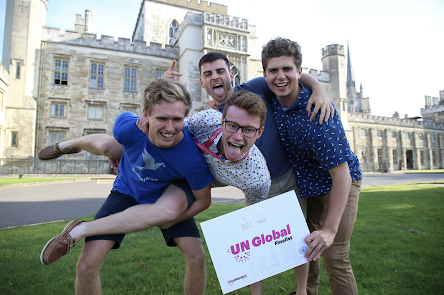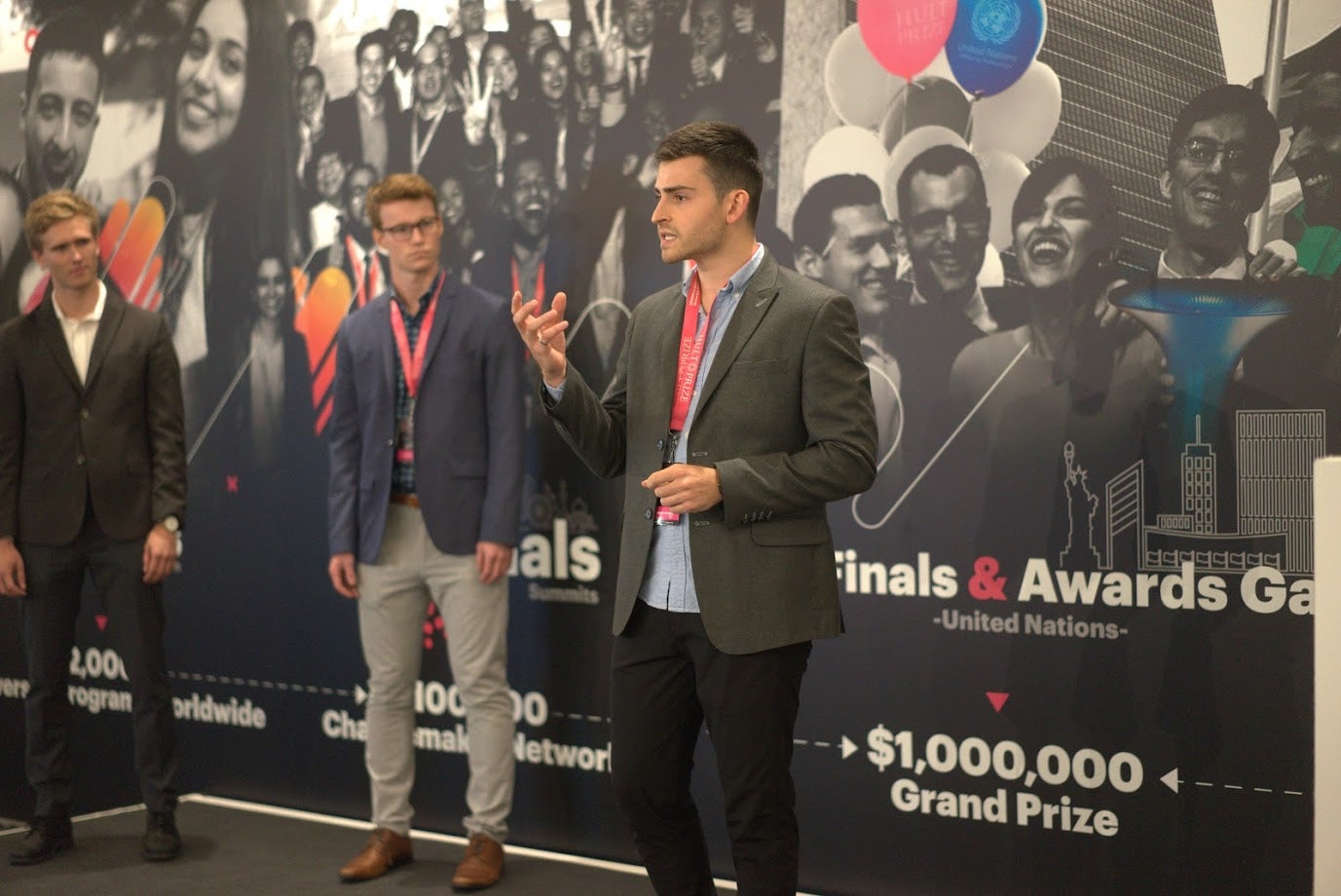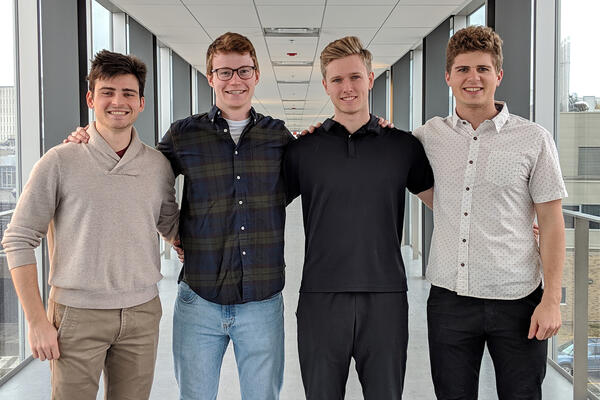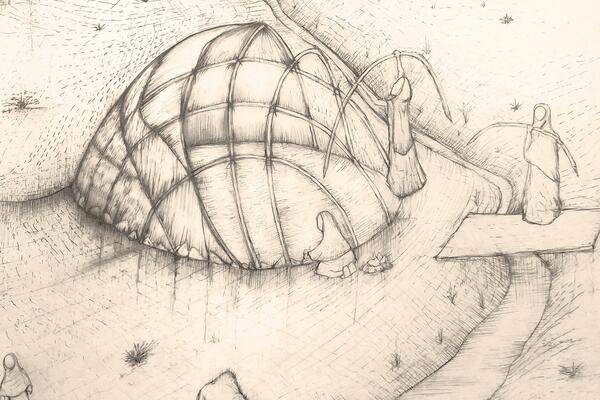
Waterloo team pitches for $1 million at United Nations
Four new grads tackle youth unemployment in attempt to win million-dollar prize

Four new grads tackle youth unemployment in attempt to win million-dollar prize
By Carol Truemner Faculty of EngineeringIt was the fairy-tale ending that came true.
After securing a top place finish at this year’s Hult Prize Startup Accelerator located in an English castle, a Waterloo team will compete this week at the United Nations in New York City for $1 million.
Recent mechatronics engineering grads Mitchell Catoen, Devon Copeland, David Ferris and Rareș Topor-Gosman will go head-to-head against five other teams, whittled down from more than 100,000, during the last leg of the 2019 Hult Prize Challenge. This round marks the fourth and final stage of pitches in the competition recognized as the largest student social entrepreneurship competition in the world.
 Waterloo Team Phonic celebrates at the English castle Hult Prize accelerator after being chosen to pitch its startup at the United Nations this Saturday.
Waterloo Team Phonic celebrates at the English castle Hult Prize accelerator after being chosen to pitch its startup at the United Nations this Saturday.
On September 14, the team will pitch its company, Phonic, to an elite team of judges, including President of Earth Day Network Kathleen Rogers, Executive Director of UNICEF Henrietta H. Fore, and actress-turned-entrepreneur Jessica Alba. The $1 million cheque presentation will be made by former U.S. President Bill Clinton. Each year, Clinton comes up with the Hult Prize challenge, which is currently focused on youth unemployment.
Phonic’s business concept is entirely different from the one team members originally developed while participating in their fourth-year social entrepreneurship course offered through the Conrad School of Entrepreneurship and Business and at the Hult Prize Startup Accelerator.
When the team arrived in England in mid-July, members were still focused on their original startup called Better Bail for America (BB4A), designed to help prevent youth unemployment in the United States by enabling young, employed, first-time offenders facing minor charges to access crowdfunded, interest-free bail.
After presenting BB4A on two consecutive “Pitch Fridays” to judges and the other 37 teams, the four team members concluded that while their idea had merit, they lacked the necessary legal background and faced a lot of political adversity to make it work.
“We felt it was important for us to acknowledge those challenges and to think realistically about if we were the right team to solve the problem,” says Copeland. “We ended up deciding to pivot to our new business.”
The idea behind Phonic stemmed, in part, from the problems the team experienced in trying to undertake market research for BB4A. Members found it difficult to have conversations with people who had gone through the bail system themselves or were trying to pay bail for friends.
Overnight, team members came up with a slide presentation and live demo supporting their new business venture that would pay youth anywhere in the world to conduct guided audio interviews on Phonic’s app. Through AI, meaningful data from responses would be extracted with insights shared on an intuitive dashboard with clients.
On the fifth and last Pitch Friday, the Waterloo team members found out they were moving on to New York. One of six finalists, Phonic is the only Canadian startup competing. Two years ago Epoch, a University of Waterloo team that developed a mobile marketplace to better connect refugees to the community, also made it into the last round.
“We were completely and utterly stunned to discover we were going to New York,” says Catoen. “There were so many teams at the castle that are already doing so much good and making an impact as well as generating revenues.”
Both Catoen and Copeland think the judges were impressed that the team was able to come up with an innovative, as well as disruptive, business concept halfway into their stay at the English castle incubator.
Both agree that their University of Waterloo mechatronics engineering education has been instrumental in their success throughout the Hult prize competition, which began with the Waterloo competition finals held at the Conrad School last November.
“As mechatronics engineers, we are very, very cross-disciplinary,” says Catoen. “We work on a lot of software, but we also do mechanical design – two very, very different things that helped us with both our startups. Our background also helps us to think outside the box to what new problems exist and how to solve them uniquely.”
The Hult Prize final competition at the United Nations will be livestreamed beginning at 2:30 p.m. EST Saturday, September 14.
 Rareș Topor-Gosman, right, pitches Team Phonic at the English castle Hult Prize accelerator supported by Mitchell Catoen, far left, and David Ferris.
Rareș Topor-Gosman, right, pitches Team Phonic at the English castle Hult Prize accelerator supported by Mitchell Catoen, far left, and David Ferris.

Read more
Recent alumni take their project to a prestigious business incubator in Henry the VIII’s former home

Read more
Grad student’s winning paper illustrates the paradoxes of Somali nomadism and the desire for a temporary hut to be a home

Read more
Waterloo students’ capstone design project nationally recognized for overcoming accessibility barriers
Read
Engineering stories
Visit
Waterloo Engineering home
Contact
Waterloo Engineering
The University of Waterloo acknowledges that much of our work takes place on the traditional territory of the Neutral, Anishinaabeg, and Haudenosaunee peoples. Our main campus is situated on the Haldimand Tract, the land granted to the Six Nations that includes six miles on each side of the Grand River. Our active work toward reconciliation takes place across our campuses through research, learning, teaching, and community building, and is co-ordinated within the Office of Indigenous Relations.